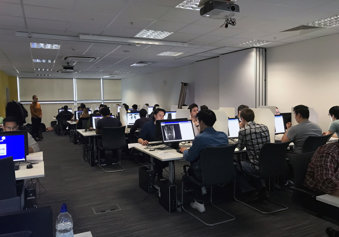Specialty training
Introduction
This section aims to provide all the information that trainees and trainers alike will need from enrolling with the College at the start of training to entry onto the GMC's Specialist Register and everything in between.
Your frequently asked questions:
The RCR oversees the training and curriculum for clinical oncology, clinical radiology and the sub-specialty of interventional radiology. Trainee subscriptions go some way towards funding the RCR’s work in supporting training, for which we receive no external or central funding. This work includes:
- Developing and maintaining curricula in line with GMC standards
- Ensuring that national recruitment processes are practical and fair
- Ensuring that workplace-based assessments are effective and useful
- Providing an e-portfolio to support the gathering and review of evidence of progress
- Tracking trainees' progress and making recommendations for CCTs to the GMC
- Supporting training programmes by providing information, guidance and networking opportunities
- Providing advice and support to individual trainees as their circumstances change
- Providing advice, recognition and support for time out of programme
- Quality assuring specialty training and providing annual reports to the GMC
- Providing external advisers to ARCP panels
- Supporting national and regulatory initiatives and developments in training (HEE, GMC etc)
- Promoting training in our specialties to undergraduates and pre-specialty doctors.
In addition, trainees have access to a range of benefits as members of the RCR.
All UK trainees are required to take the FRCR examinations. These examinations are also very popular internationally, with doctors taking them either in the UK or in our overseas locations in Hong Kong, Singapore and India.
Breakdown of training income and costs
Based on the 2016 accounts.
|
Income |
£1000s |
|---|---|
|
Annual subscriptions and CCT fees1 |
481 |
|
Fellowship fees2 |
133 |
|
Total |
614 |
|
Costs |
|
|
Training quality and policy |
473 |
|
Trainee and trainer support |
589 |
|
ePortfolio provision |
39 |
|
Total3 |
1,101 |
Notes:
- Includes membership and Fellowship subscriptions from UK trainees. CCT fees included here were merged into subscriptions during 2017.
- One-off fees from UK trainees for entry to the Fellowship. This fee will be abolished and some of it merged into subscriptions in 2018.
- Costs of membership benefits not included
Breakdown of FRCR exam fees and costs
Based on the 2016 accounts.
|
Income |
£1000s |
|---|---|
|
UK Candidate fees |
734 |
|
Overseas Candidate fees |
910 |
|
Total |
1,644 |
|
Costs |
|
|
Central costs1 |
933 |
|
Exam creation and delivery2 |
469 |
|
Total3 |
1,402 |
Notes:
- Staff, overheads, policy, quality assurance, share of central RCR costs
- Venue hire, invigilators, equipment hire, standard setting, question writer and examiner travel and subsistence
- The central costs and a large element of exam creation costs would be incurred regardless of the number of overseas candidates taking the examinations. The exam delivery costs do include the cost of accommodating overseas candidates but we are not able to separate out these costs, so we are choosing to show all income and costs, not just those directly attributable to UK trainees.
It is important that you keep us informed about any changes to your training so that we can advise you about the effects of these upon your eligibility for the FRCR examinations and the expected date for the completion of your specialty training.
This includes any changes to the number of sessions per week at which you are training, sickness absence, statutory leave, out of programme activities or training, subspecialty training or changes to your training location. You can update the RCR on changes to your training through the e-portfolio (please see the user guide for further information).
Radiology Training - What good looks like, now and in the future
We look at how teaching, diagnostic and procedural training has adapted and the innovations that are likely to stay. We recognise that there is still lot of work to do, but we hope that training programmes will continue to build on these positive developments – allowing for the training of more radiologists year-on-year.
Radiology training 2016 - 2026: a vision and a solution
The RCR puts forward a clear vision of what could be achieved in response to the severe workforce crisis in clinical radiology.
Find out more about specialty training
Enrolling with the College
Find out more about how to enrol with the College.
Risr/advance
Risr/advance (formerly known as Kaizen) is the our e-portfolio system used by trainees, supervisors and the Annual Review of Competence Progression (ARCP) panel.
Training guidance for clinical oncology
Links and documents can be found here that are supplied in support of trainees and trainers.
Training guidance for clinical radiology
Links and documents can be found here that are supplied in support of trainees and trainers.
Quality Assurance
Quality Assurance is an essential part of the management of education and training. The GMC has overall responsibility for quality assurance, which it does by establishing and overseeing standards and outcomes in medical education through its Quality Assurance Framework.
Completing training (CCT)
To receive a certificate of completion of training (CCT), doctors must submit an application to both the RCR and the GMC within 12 months of their training completion date.
Clinical oncology curriculum
The curriculum provides a training framework, describing the standard required to achieve a certificate of completion of training (CCT) and the expected levels of progress throughout training.
Clinical radiology curriculum
The clinical radiology curriculum aims to meet patient and service need by ensuring that trainees develop the specialty-specific capabilities necessary to become a consultant radiologist.
Our exams and training
Discover our resources on exams and training, which include help and guidance on taking the exams, alongside regulatory policies.
